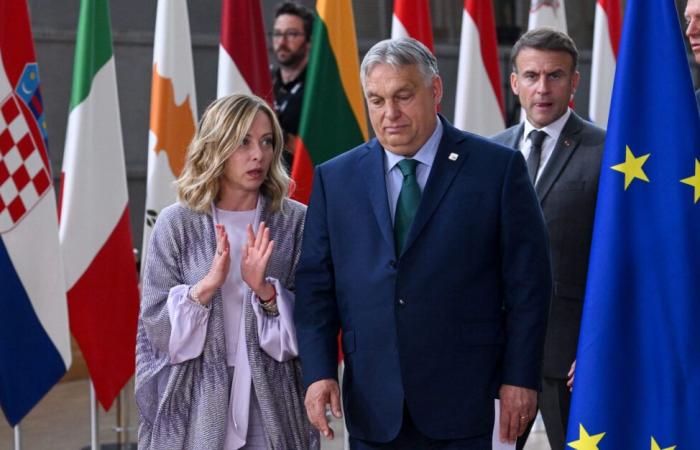Brussels – It was supposed to be a united camp to become “the second group in the European Parliament”. It was supposed to be an overwhelming “force for Europe”, which would change the balance in Brussels, capable of “reshaping the configuration of the European right, or even supplanting the European People’s Party”. And instead the not irresistible rise of the conservative, nationalist, sovereignist and extreme right-wing parties in the European elections of 6-9 June is turning into a huge soap bubbleleaving an even more divided and contentious field on the ground, which does not touch the ball and is divided at the European Council and – instead of uniting – is split into even more pieces at the EU Parliament.
If we want everything to stay the same, everything must change.he wrote in 1958 Joseph Tomasi of Lampedusa. More than sixty years later the European right, against its will, has taken leopardism and made it almost a sentence: almost everything is ready to change (inside), but almost everything will remain as before (outside). Because the European Council late yesterday evening (27 June) appointed the new leaders of the EU institutions, which are then the expression of a well-known Union: the German People’s Ursula von der Leyen for the encore at the European Commission, the first liberal minister of Estonia, Kaja Kallaas the EU’s High Representative for Foreign Affairs and Security Policy, and the former Socialist Prime Minister of Portugal, Antonio Costato the European Council.
At the table of heads of state and government, the leaders who would have liked to overturn the balance between the Twenty-seven were left on the sidelines and did not even vote together. The Italian Prime Minister and president of the European Conservative and Reformist Party, Georgia Meloniaware that she had no room for maneuver at the European Council table, was the only leader not to vote in favor of any of the three candidates (she abstained only on von der Leyen). Her Hungarian colleague, the owner of the above quotes, Viktor Orbánhe was first outraged by the fact that “this agreement is a disgrace and is not based on the result of the elections”, but then he approved Costa and abstained on Kallas. The basis was the agreement of the negotiators of the Popular, Socialist and Liberal parties. – who have decided and will continue to decide the fate of the Union – and all the other leaders followed suitregardless of the color of the government they represent. Because it is still true that the far right has already entered, or decisively supports, the governments of 7 member countries, but at the first opportunity to influence Brussels it failed to transform the demands for a “Europe of nations” into names of rupture with the past. Or even just to maintain a common line.
The European Right in the European Parliament
If anything, the speech to the European Parliament shows even more clearly how the European right is in a moment of disarray. The single camp project with a mega-group failed between European Conservatives and Reformists (ECR) and Identity and Democracy – never really a credible option, in truth – after the European elections the two sides immediately began to reorganise in Brussels without opening up a dialogue table, on the contrary, fighting over members and causing immediate friction between national parties due to opposing nationalisms. An example of this was the ruling Hungarian party Fideszwhose 10 unaffiliated MEPs closed the door to joining the ECR group – despite months of political flirtation between Orbán and Meloni on the issue – due to the previous membership of 5 new members of the Romanian ultranationalist party Alliance for the Union of Romanians (Aur). Or, again, the split within the French ultra-nationalist far right of Reconquest for the skirmishes over the relationship with the far right of National Rally in view of the early elections in the country: after the expulsion of four of the five elected MEPs (now ready to found a new formation, but in the meantime already part of ECR) it is left with only one representative, who still does not know in which group she will end up.
There is time until next Thursday (4 July) for the formal constitution of the new political groups in the European Parliament. These are hectic days in Brussels due to the turmoil created by various rumors about the birth of new formations which, if they come to fruition, will further fragment the European right-wing field. After days of behind-the-scenes activity, the project of the new group “The Sovereignists” led by the German radical right party seems to be at a standstill Alternative for Germanywhich has strengthened itself in Brussels with 15 members, but is facing expulsion from the ID group due to the statements of its leading candidate, Maximilian Krah, on the failure to condemn the past of the Nazi SS special forces. And for this reason he is now looking for a solution to avoid condemning himself to political irrelevance in the non-member group. To form a new parliamentary group, no fewer than 23 deputies from at least a quarter of the member states are needed (7) and the AfD could be joined by a host of small and micro-extremist parties: from pro-Russian and anti-European Bulgarians to Vazrazhdane (‘Rebirth’) to the Polish populist ultra-right of Confederationup to the Spanish populist movement The Party Is Over (‘The party is over’), the Greek national-conservatives of Democratic Patriotic Movement – Victory (Nikh), the Romanian irredentists of S.O.S. Romania and the Hungarian ones Our Homeland Movementand the Slovak neo-fascists of Republic.
And then there is the real bomb that could explode at any moment in the field of the European right, which has the potential to blow up the sovereignist agreement between Meloni, Orbán and the Poles of Law and Justice (PiS) of the former -premier Mateusz Morawiecki. The Hungarian prime minister’s decision to definitively close off the prospect of joining the same party group as his Italian counterpart – to whom he always addresses honeyed words – immediately seemed suspicious, in particular if one considers the concomitant departure from the party’s Renew Europe group Czech liberal-conservative populist Again 2011 dell’ex-premier Andrej Grandma. Both leaders have been talking for days about a new group in the European Parliament that should represent the Visegrád Group countries – Hungary, Czech Republic, Slovakia and Poland – and not only that, but which would immediately enter into a collision course not only with that potential new group of Sovereignists (for the search for members), but above all with that of Ecr for the fragile balance between nationalisms.
Because the big fish for Orbán is precisely Meloni’s closest ally in the conservative European right group: the PiS of Morawiecki, who yesterday had opened up to the possibility of leaving Ecr but today he has already retracted and said he is ready to resume dialogue with the Italians for the distribution of positions in the group, after the postponement of the founding meeting scheduled for 26 June. Actually There is a strong political point of division between Hungarians and Poles: the relationship with Putin’s Russia. If it could be overcome, but it now seems difficult, in the name of the traditional “we are in the same group but each one of us votes according to his choices”, together Hungarians (10), Poles (20) and Czechs (7) – with other additions necessary for the 7-country rule – would build a more substantial force than the Left group (39 members). But most of all would empty ECR relegating it to fourth place with 63 members and already making its overtaking of the liberals of Renew Europe (75) in third place among the parliamentary groups vain.
Regarding the fourth member of the Visegrád Group, Slovak diplomatic sources let it be known to Eunews that there is currently no interest and that it is the only option on the table for the two red-brown parties Direction-Ssd (of the prime minister Robert Fico) e Voice-Sd (of the president Peter Pellegrini) is a perhaps impossible reunion with the family of social democrats after the expulsion last autumn due to the birth of the government with the nationalist far right. The same sources indicate that “there are other parties without affiliation”, namely those neo-fascists of Republika who are contested by the ‘Sovereignists’ of AfD. In short, it had to be “the second group in the European Parliament” to change the balance of the Union. Instead, the European right risks splintering and arguing even more internally, while on the outside – where decisions are made – everything remains as it has always been.






